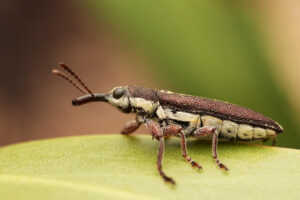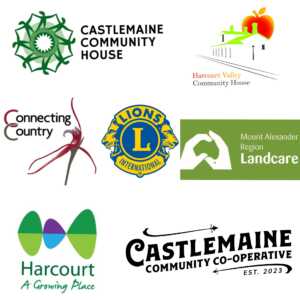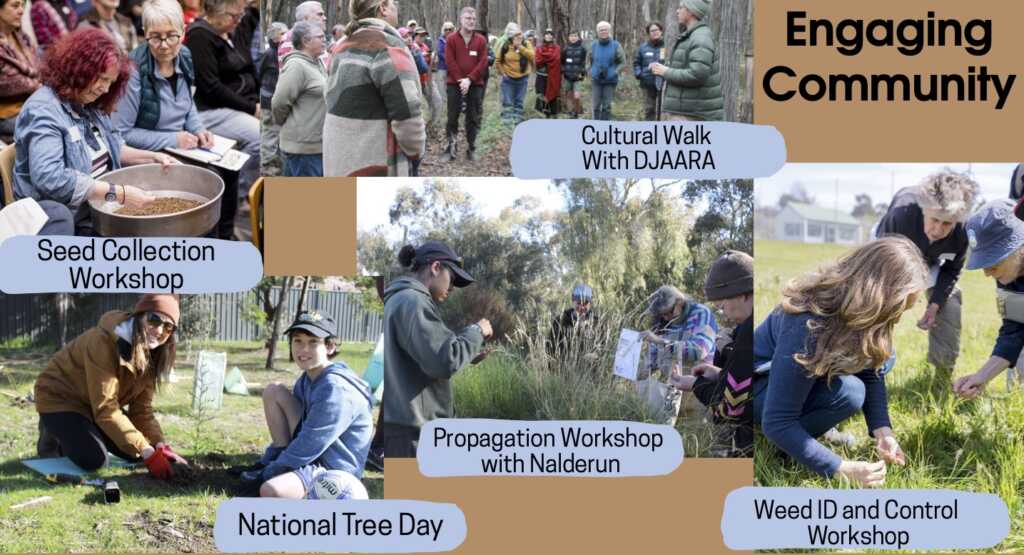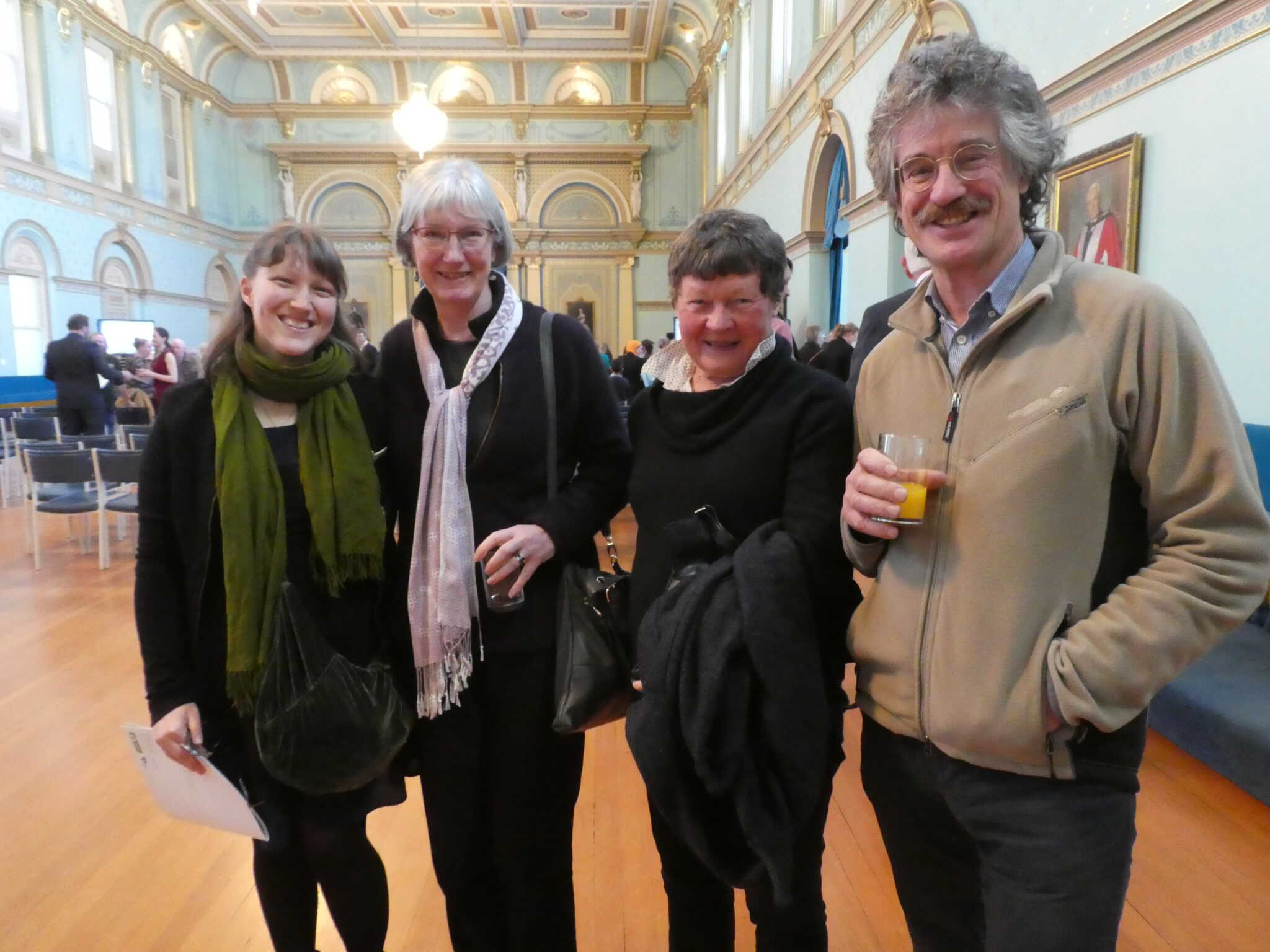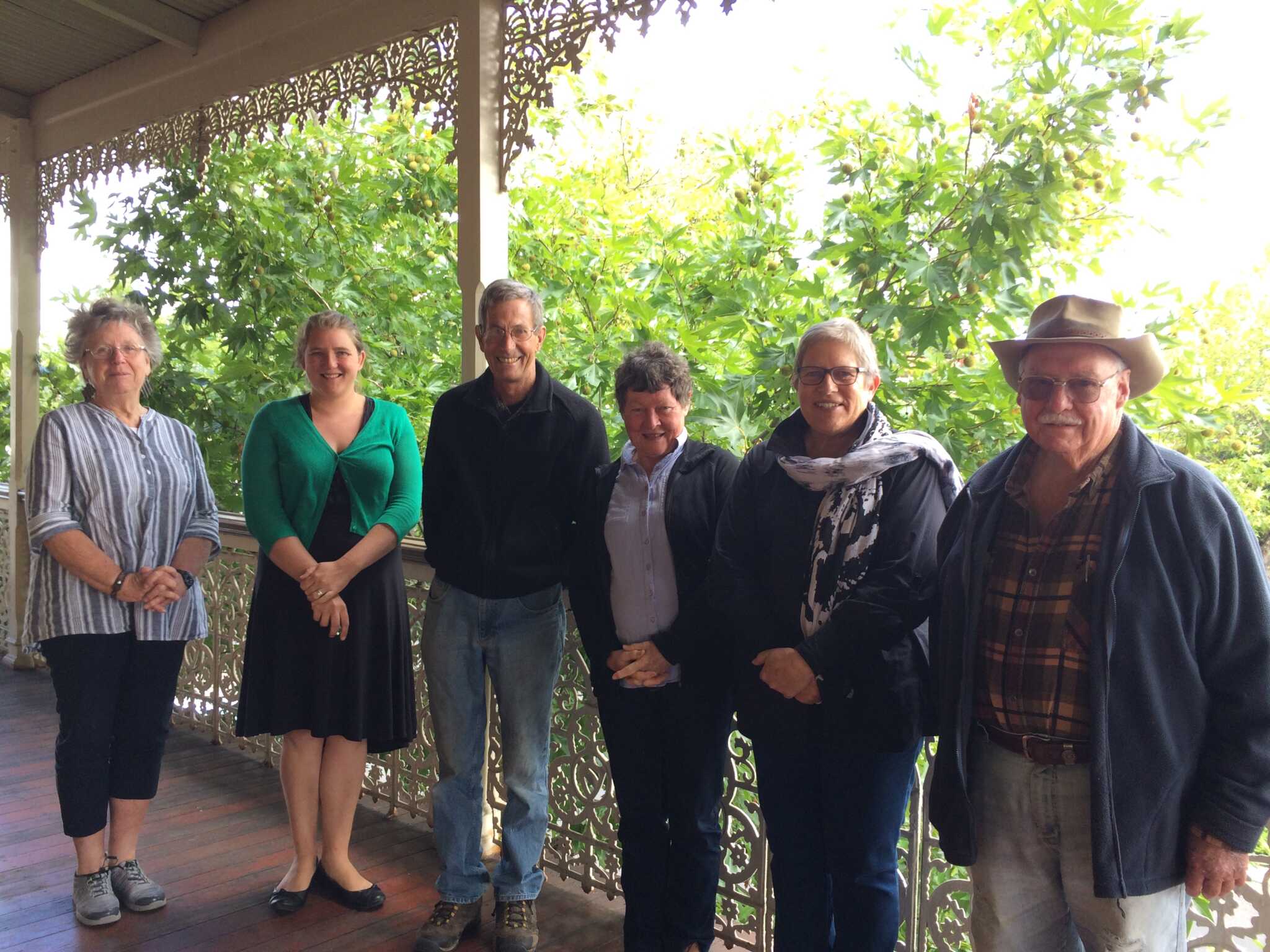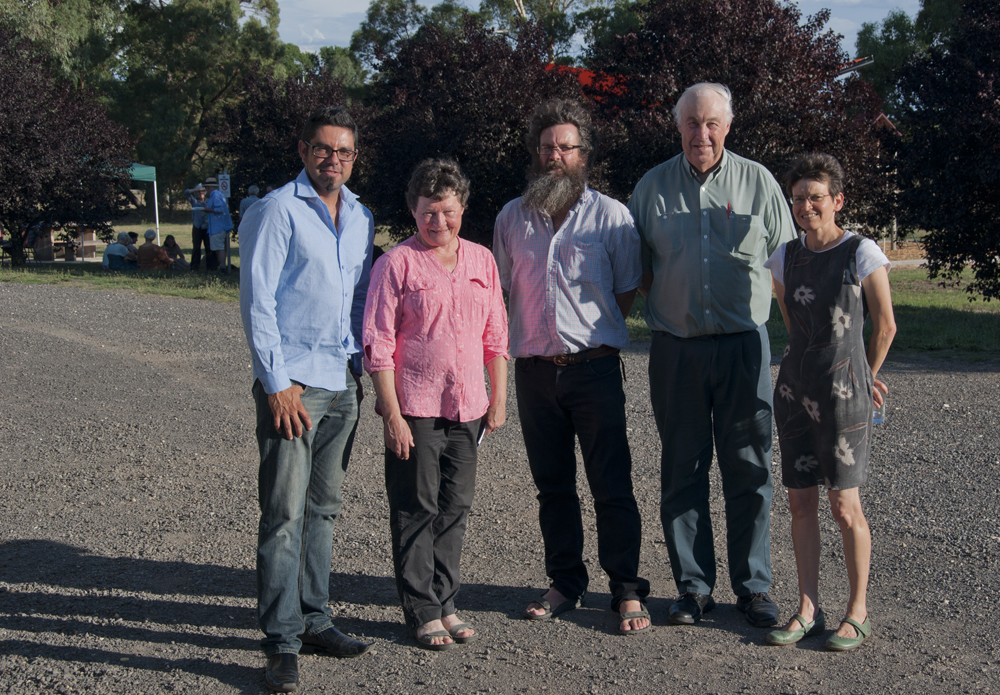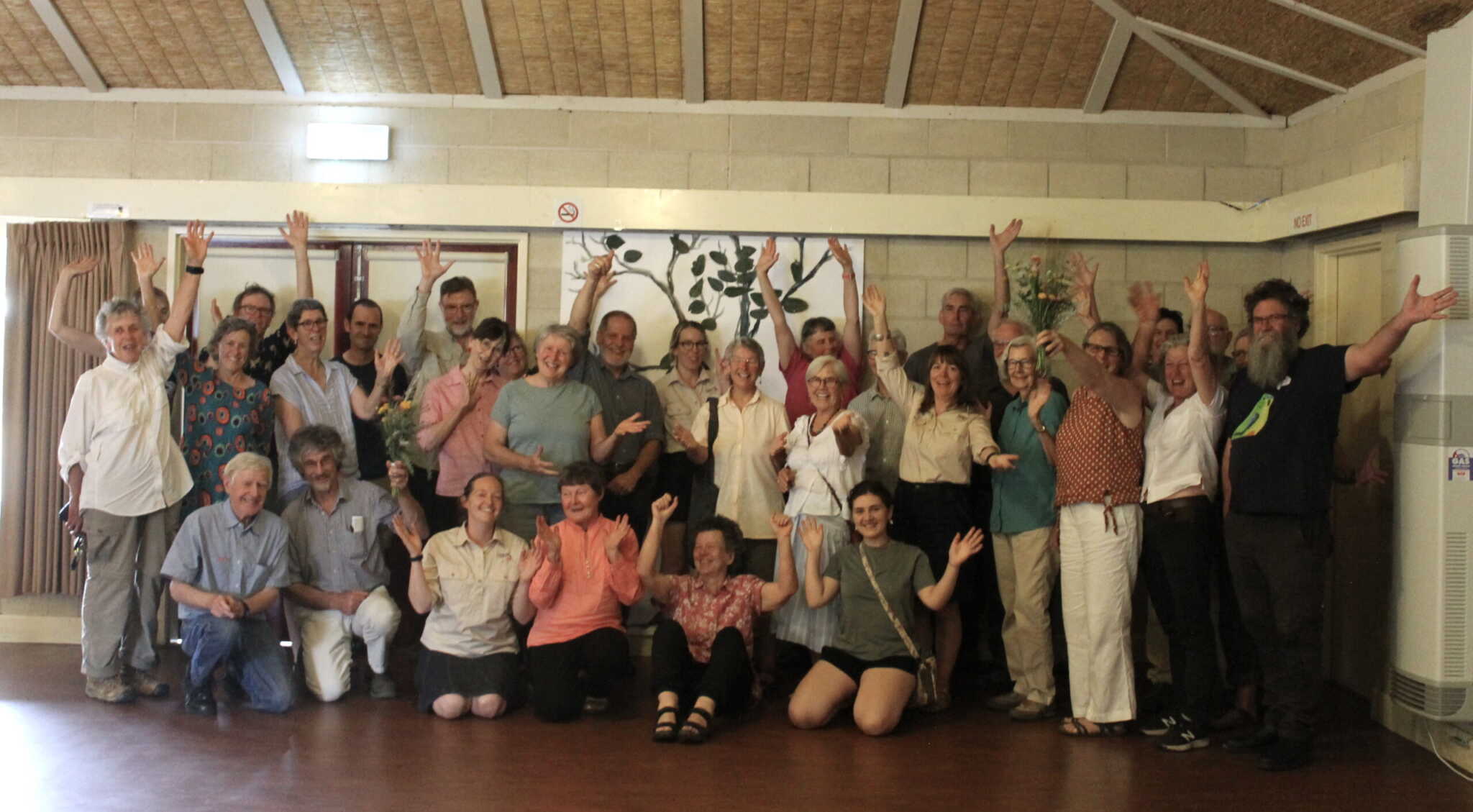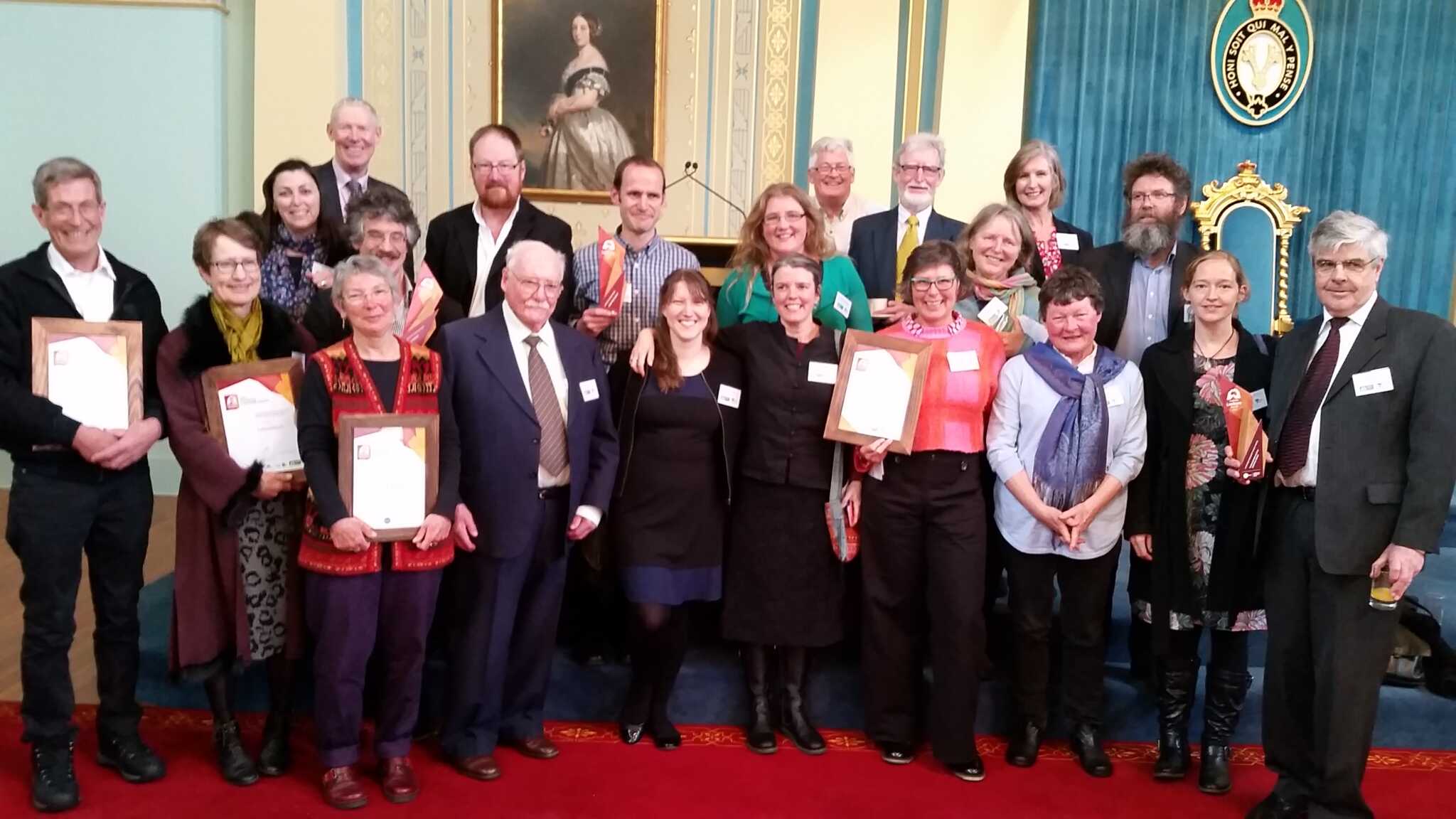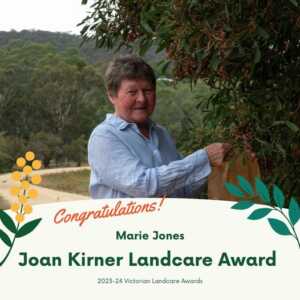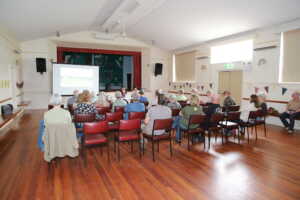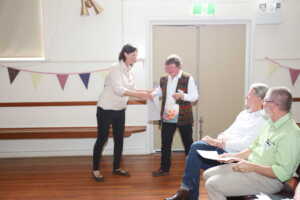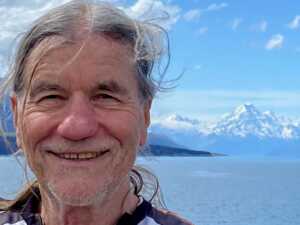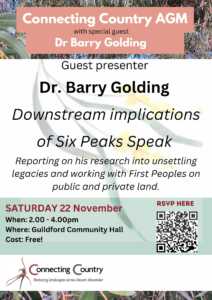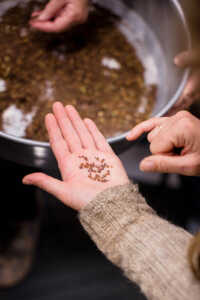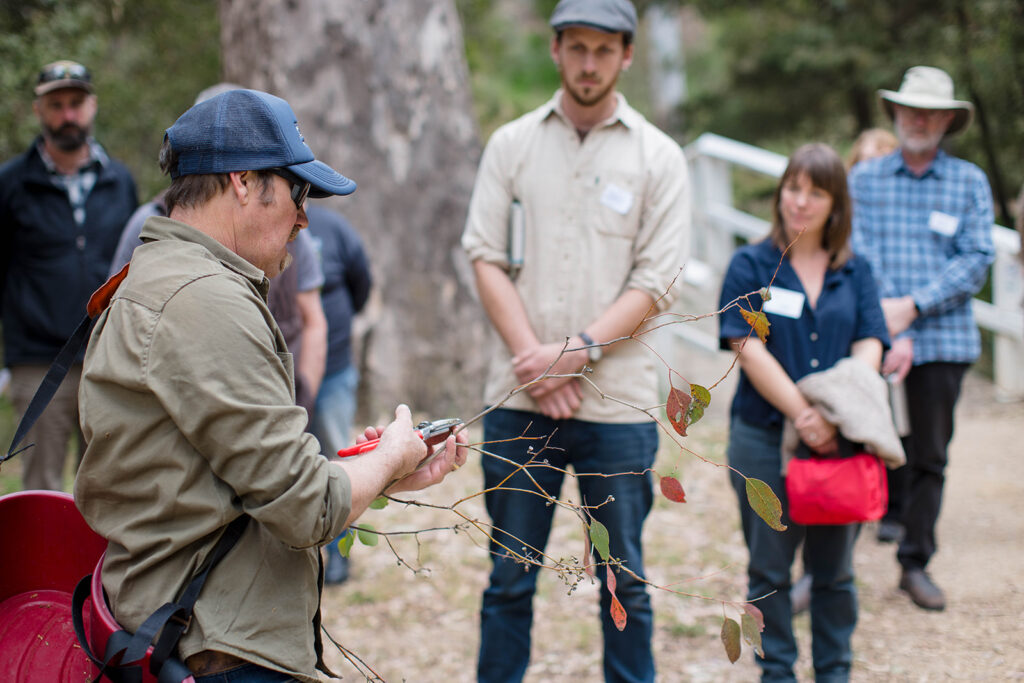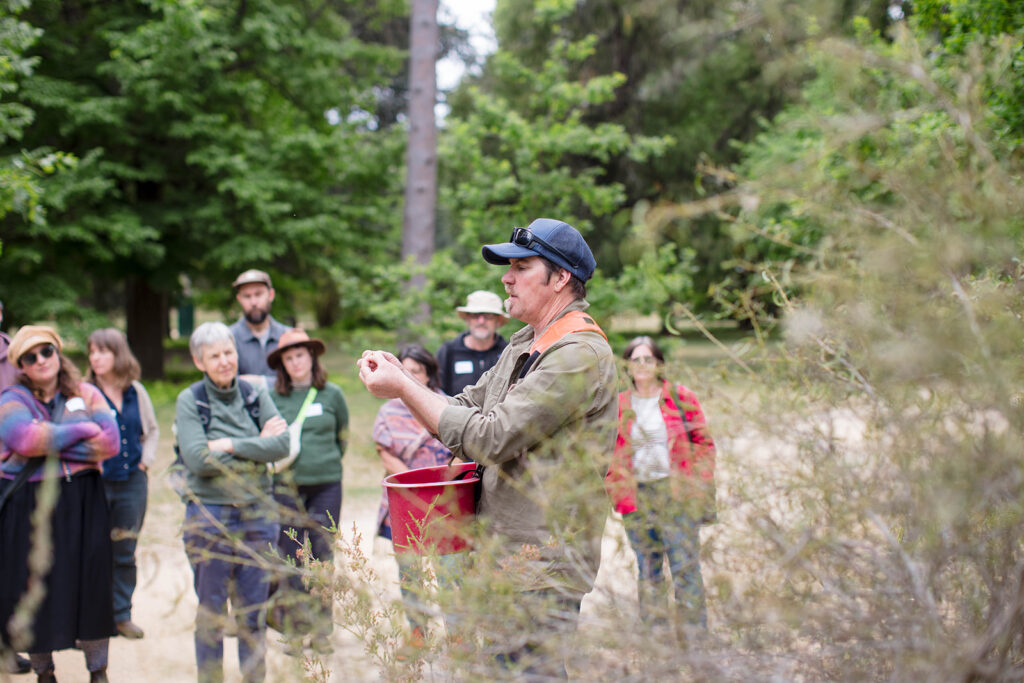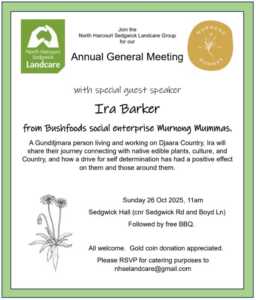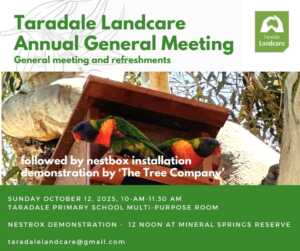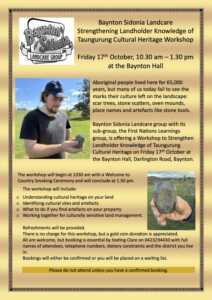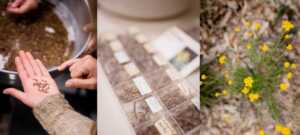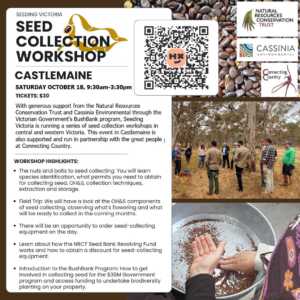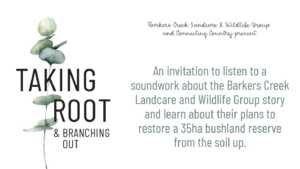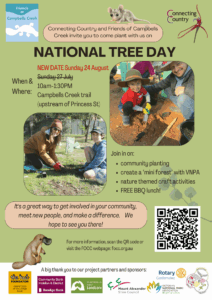‘Intriguing invertebrates and concerning trends’ with Patrick Kavanagh
Posted on 11 February, 2026 by Lori
Castlemaine Field Naturalists Club are excited to have local entomologist Patrick Kavanagh launch their new “Butterflies of the Mount Alexander Region” brochure at their February Monthly Meeting.
Patrick has lived in a patch of box woodland at Strangways for 30 years. He uses macrophotography to discover the tiny invertebrate life that makes the local ecosystem work.
Following the brochure launch, Patrick will share some of the intriguing discoveries he’s made in his yard with a camera and an internet connection. He will also talk about some concerning trends in our invertebrate populations over the past few years and how these trends affect other species.
Observations. Members and visitors are invited to share their recent interesting observations at the start of the meeting. Please email any photos as uncropped JPEG file(s) and supporting notes to Jill Williams (jilliwill33@gmail.com) by noon on the day of the meeting.
When: Friday 13 February 7.30pm
Where: Uniting Church Hall, Lyttleton Street, Castlemaine
All welcome.
Following the meeting, the ‘Butterflies of Mount Alexander Region’ will be available to purchase at the Castlemaine Information Centre and the Made in Castlemaine stall at the Vintage Bazaar (Mill Complex).
Photo: Belid Weevil Photo by Patrick Kavanagh
Support for bushfire recovery in Harcourt and surrounds
Posted on 14 January, 2026 by Lori
Connecting Country Committee and staff are saddened by the damage caused by the Ravenswood South bushfire and our hearts go out to all those affected. We hurt for our friends at Harcourt Valley Landcare, North Harcourt & Sedgwick Landcare and Sutton Grange Landcare and the many years dedicated to caring for the local environment that has been damaged. We are dedicated to working with these communities in their land and environmental recovery needs and have had many offers from fellow Landcare Groups also wanting to help.
Connecting Country is collaborating with Castlemaine Community House, Harcourt Valley Community House, Harcourt Progress Association, Castlemaine Community Investment Co-operative, Castlemaine Lions Club, local Landcare groups and others to coordinate a volunteer and equipment register to help longer-term bushfire recovery. People or organisations/groups can register their skills, time and useful equipment. These could be used in activities including clean up, workshops on insurance claims, fencing, repairs, re-vegetation, technology, rebuilding, or fundraising.
We are working with organisations in Harcourt to match resident’s needs to offers. This will co-ordinate help through a trusted local, reducing stress for affected people. This is a volunteer matching service, not an emergency response.
The form to register is here: Needs & Offers (Volunteer & Equipment) Register – Castlemaine Community House
Immediate response needs (food, shelter, clothing, agistment, etc) are being dealt with through Mount Alexander Shire Council’s Recovery Centre in the Town Hall from 12th to 19th January. The best way to support at present is by donating money to the Harcourt Progress Relief Fund or the Bendigo Bank Victorian Bushfire Appeal.
BlazeAid are establishing a local camp to assist with fencing and farm infrastructure opening next week (19th January) and will be looking for volunteers – follow the BlazeAid Facebook page to keep abreast of details.
Looking after yourself
These events can cause stress in those directly impacted and those supporting them. Please note Landcare members can access a free and confidential support program through Acacia Connection’s Employee Assistance Program as part of the DEECA Landcare Support Program if referred to by the Local Landcare Facilitator. If you, or someone you know, could benefit from this service, please reach out to me via email. Services available including counselling, legal referral, dietician support and financial coaching.
2025 End of Year Retrospective
Posted on 22 December, 2025 by Hadley Cole
As the year draws to a close we clear our desks, hang up our boots, wash down the big red Connecting Country ute, and take a moment to think about what we have achieved this year. Like many environmental orgnisations 2025 has brought times of financial hardship and sadly the scaling back of staff and projects. Despite this the Connecting Country team, staff and volunteer committee members have rallied together and delivered numerous educational events attracting many community members from across the region, we continue to coordinate and deliver biodiversity monitoring through the engagement of volunteers and we partner with many local and regional organisations to deliver our events and projects.
Throughout the 2024/25 financial year we delivered 6 educational and community engagement events attracting around 350 people, supported 26 Landcare Groups, coordinated 192 bird surveys carried out by our dedicated volunteers and partnered with over 26 non-government and government organisations. For a small community not-for-profit organisation operating with less than a handful of part time staff and a volunteer committee we are proud of our achievements and remain dedicated to the work we do.
Connecting Country staff will be taking a break over the festive season. The office will be closed from Monday 22 December until Thursday 15 January 2026. Any inquiries made during this time will be responded to when we return to the office in January 2026.
We are so grateful to our donors, volunteers, and supporters! We wish you all a happy end of year and relaxing festive season.
Take some time to learn more about our achievements for the 2024/25 financial year in our annual report: 2024-25 Annual Report
Farewell Marie Jones after 17 years!
Posted on 11 December, 2025 by Hadley Cole
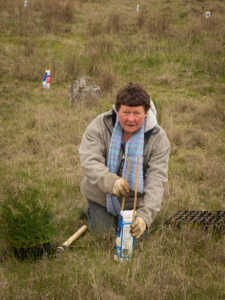 At Connecting Country’s 2025 AGM we wiped away a tear or two as we said farewell to Connecting Country stalwart and superstar Marie Jones. Marie has been involved with the organisation since its inception and has at one point or another held every single position on the executive committee, from Treasurer, to President, Secretary and all roles in between.
At Connecting Country’s 2025 AGM we wiped away a tear or two as we said farewell to Connecting Country stalwart and superstar Marie Jones. Marie has been involved with the organisation since its inception and has at one point or another held every single position on the executive committee, from Treasurer, to President, Secretary and all roles in between.
In 2007, Marie was instrumental in the creation of Connecting Country. Over the last 17 years she has worked tirelessly to ensure that Connecting Country is successful and sustainable. She has been involved in at least four sub-committees of the organisation including the Landcare Steering Group, where she provided hours of support and mentorship to the various staff that took up the role as the local Landcare Facilitator.
Marie began her volunteer career in the local community over thirty years ago! Throughout this time, she has guided many projects that will have a lasting impact on the local environment, heritage and people across the Chewton, Castlemaine and entire Mount Alexander region. She has been involved in many local community groups including, Golden Point Landcare, Post Office Hill Action Group, Friends of the Box Iron-bark Forests, just to name a few!
In 2024 Marie’s dedication to volunteering over the past three decades was recognised when she received the Joan Kirner Victorian Landcare Award. It was no surprise to the Connecting Country team when Marie’s name was called out. We all knew she was deserving of the award, we were thrilled that the rest of Victoria and the statewide Landcare community also recognised her contribution.
Photos above from left to right: The inception of Connecting Country. Fire & Biodiversity event (2014), Landcare Network Award (2017)
Marie is often the thread linking various community members and organisations within the Mount Alexander region together. She has a wonderful ability to bring people together and enable civil and respectful discussions around, what are at times, controversial topics. She is an exceptional grassroots environmental leader. She is the person people want to talk to about new ideas, about government funding, about issues groups may be having, about issues in the community, about working with other groups, about forming new committees or working on arising issues.
Perhaps one of Marie’s most outstanding achievements has been the work she put in behind the scenes to establish Connecting Country. Although its creation was a joint effort by many, everyone involved will attest that Marie was a driving force whose skills, knowledge and commitment were critical to its success. She was instrumental in engaging the widest range of stakeholders possible during the establishment process, particularly encouraging Landcare groups and their members to become involved, which they did. One of the defining things about Marie is that she takes a constructive and positive approach to any situation. She treats everyone as a person, with respect, no matter what disagreement or problem there is to work out.
Marie has a saying “think globally, act locally”, which articulates that the actions we take in our own patch can have a ripple effect across communities at the regional, state, national and even global level. Marie’s ability to keep all the parts of an issue in perspective is a strength that makes her relatable to many people within the community.
The entire Connecting Country community greatly appreciates Marie’s contribution, and whilst she has stepped down from the Committee, we know she will stay well-connected through Landcare and other local pursuits. We hope that stepping away from the Connecting Country responsibilities will create more time for her and her partner John to spend time with family and friends and enjoy some well-deserved down time.
Words from current Connecting Country staff and committee members about Marie:
I had known Marie for many years but it was after a FOBIF walk on my farm at Yapeen in 2016 that Marie approached me to join the Committee of Connecting Country. I have always been impressed by Marie’s energy, enthusiasm, excellent communication skills and her involvement in community and environmental matters. She has been an invaluable member of the Connecting Country Committee and a joy to work with. – Max Kay, Connecting Country Treasurer
It has always been a joy to come to work and see Marie. She is always helpful, supportive and knows just how to handle every situation. She has a knack of knowing exactly what is going on and what is needed at the right time. She will be greatly missed. Thankyou for everything Marie! – Bonnie Humphreys, Connecting Country Landscape Restoration Coordinator
I first met Marie when we were members of regional committees with the North Central CMA, almost 20 years ago, and she subsequently got me involved in Connecting Country when we moved to Faraday. Marie’s passion for environmental enhancement and protection, is well known, as is her great concern and support for the well-being of our communities. Her dedication to everything she takes on is awe inspiring. It has been a great pleasure working with Marie at Connecting Country – great conversations, many problems to solve, many laughs to be had and all in a very positive and cheerful way. I’m hoping there will be many more opportunities to work with her in the future. Can we call catching up for coffee “working”? – Chris Brooke, Connecting Country Committee Member
When I started at Connecting Country, Marie went out of her way to make me feel welcome with a coffee and a local field guide. She has always shown and appreciation and respect for staff, quickly responding to any queries and never shying away from the challenging issues. Her involvement across many aspects of the community means she always brought valuable community voice into project planning and decision making. I will miss Marie on the Committee but I know it won’t be the last we see of her. – Lori Arthur Connecting Country Director/ Landcare Facilitator
When I first started with Connecting Country as the Landcare Facilitator in 2021, Marie immediately made sure I knew she was their to support me in my new role. Her knowledge of the local community is incredible! She passed on so much information of previous projects, events and partnerships between local groups and community members. Whenever I had a new idea, Marie was the first person I went to, and still do! Despite the fact that she has witnessed all the various conservation trends over her years, she always endorsed my ideas with enthusiasm and support. Marie’s diplomacy and community spirit will be greatly missed by all at Connecting Country. Hopefully she and John can now take a well earned rest! – Hadley Cole former Landcare Facilitator.
Connecting Country AGM and new committee members
Posted on 25 November, 2025 by Hadley Cole
On Saturday 22 November we held our AGM at the Guildford Community Hall. It was a lovely day to get together and celebrate our achievements for the year. Connecting Country members and supporters enjoyed brief AGM formalities that were followed by a presentation from Dr. Barry Golding and a wonderful afternoon tea provided by the Guildford Store.
Dr. Barry Golding took the opportunity to reflect on his book Six Peaks Speak, published in 2023. Dr. Golding spoke of the great amount of evidence that is recorded in Central Victoria demonstrating Dja Dja Wurrung occupation of this Country for millenia, and the importance of protecting artefacts and culture that still exist in the landscape. The ‘Six Peaks’ refers to Mounts Kooroocheang/Gurutjanga, Beckworth/Nyaninuk, Greenock/unknown, Tarrengower/Dharrang Gauwa, Alexander/Liyanganuk, and Franklin/Lalkambuk. In his book Golding shares the knowledge and history each mountain holds within their geology and writes of the importance of recognising and understanding the unsettling colonial history in the region.
This years’ AGM saw a changing of the guards as the committee farewelled long term committee member and one of the early advocates for Connecting Country Marie Jones. Outgoing president Brendan Sydes thanked and congratulated Marie for hear many years (almost two decades) of dedication to our grass roots community organisation. He noted her thorough understanding of how small, community organisations work and her diligence in knowing what needs to get done, and getting in there and getting it done. Marie’s natural approach to working with community and bringing people into the fold has been a foundation to the success of Connecting Country from the early beginnings. “You should be very proud of what you have achieved here” Brendan shared.
The entire Connecting Country community will miss Marie dearly. She has been a stalwart in the organisation since inception and has always made herself available to staff and volunteers alike.
We also saw the changing of committee roles with Brendan Sydes stepping down as president after 12 years and handing the reigns over to Stephen Oxley who has been sitting on the committee as a general member for the last 3 years. Cate Sinclair has stepped into the role of Secretary taking over from Marie after sitting on the committee as a general member for the previous 12 months. As it stands the new committee is;
President: Stephen Oxley
Vice President: Brendan Sydes
Secretary: Cate Sinclair
Treasurer: Max Kay
General members: Christine Brooke, Darren Tinker, Deirdre Slattery, Ben Welsh
We would would like to acknowledge new members Darren and Ben and returning member Deirdre and thank them for their willingness and commitment to Connecting Country. We look forward to achieving many more great outcomes for the environment together!
Connecting Country’s 2025 AGM was made possible due to the generous donation of community donors.
Connecting Country AGM with Dr Barry Golding
Posted on 13 November, 2025 by Hadley Cole
Join us for the Connecting Country 2025 AGM with special guest presenter Dr. Barry Golding on Saturday 22 November at the Guildford Community Hall.
Following brief AGM formalities, Dr. Barry Golding will give a presentation on the downstream implications of his book Six Peaks Speak, focussing on some of the broader implications and outcomes of his research for dealing with unsettling legacies and working with First Peoples on public and private land.
Dr Barry Golding AM is an Honorary Professor with Federation University in Ballarat. He self-describes as a ground-up, community-oriented, polymathic, place-based researcher and story teller. His degrees span four disciplines: geology, arts, environmental sciences and education. Barry has researched and published internationally about vocational, adult, community, First Nations and informal learning.
In 2023 Barry undertook a State Library Victoria Creative Fellowship, researching and writing a book, Six Peaks Speak: Unsettling legacies in southern Dja Dja Wurrung Country, published in 2024 with local geologist, Clive Willman and in close discussion with Dja Dja Wurrung people.His presentation on Saturday 22 November will focus on his learnings since the release of in 2024. It’s sure to be a fascinating discussion!
Presentations will be followed by a delicious afternoon tea.
When: Saturday 22 November 2025, 2.00 – 4.00pm
Where: Guildford Community Hall, 32 Fryers Street Guildford VIC
Cost: Free!
Please book for catering purposes – click here
Connecting Country AGM 2025 with special guest speaker, Professor Barry Golding
Posted on 6 November, 2025 by Lori
Please join us for our AGM with special guest speaker Professor Barry Golding – author of Six Peaks Speak, on Saturday 22 November 2025 from 2.00pm to 4.00pm
Dr Barry Golding AM is an Honorary Professor with Federation University in Ballarat. He self-describes as a ground-up, community-oriented, polymathic, place-based researcher and story teller. His degrees span four disciplines: geology, arts, environmental sciences and education. Barry has researched and published internationally about vocational, adult, community, First Nations and informal learning. In 2023 Barry undertook a State Library Victoria Creative Fellowship, researching and writing a book, Six Peaks Speak: Unsettling legacies in southern Dja Dja Wurrung Country, published in 2024 with local geologist, Clive Willman and in close discussion with Dja Dja Wurrung people.
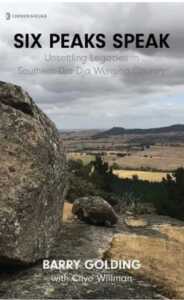 Six Peaks Speak tells the unique stories and continuing legacies of the ancient mountains in the Central Victorian region from a multidisciplinary perspective. The book bears witness to ‘unsettling’ changes over the past 200 years, as viewed from the perspective of the peaks (including Dharrang Gauwa – Mount Tarrengower and Liyanganyuk banyul – Mount Alexander) that stand sentinel over an ancient volcanic landscape and its immense natural and cultural significance.
Six Peaks Speak tells the unique stories and continuing legacies of the ancient mountains in the Central Victorian region from a multidisciplinary perspective. The book bears witness to ‘unsettling’ changes over the past 200 years, as viewed from the perspective of the peaks (including Dharrang Gauwa – Mount Tarrengower and Liyanganyuk banyul – Mount Alexander) that stand sentinel over an ancient volcanic landscape and its immense natural and cultural significance.
When: Saturday 22 November 2025 at 2.00pm – 4.00pm
Where: Guildford Community Hall, 30 Fryers St Guildford VIC
Cost: Free!
Delicious afternoon tea provided.
Everyone is welcome! For catering and logistical purposes, please register your attendance – click here
Dr. Barry Golding will present after brief AGM formalities.
AGM formalities
The following Connecting Country AGM 2025 documents are available to download:
Please note only current Connecting Country members can vote in the AGM. To become a member – click here
For more information please email info@connectingcountry.org.au or phone 0493 362 394
Nominate for the Committee of Management
Want to be more involved with Connecting Country? Why not consider becoming a committee member. We are actively looking for new committee members to broaden the skills of our Committee. The positions require 2 hours per month to attend committee meeting plus small amounts of reading or work time as required to keep the organisation rolling. If this sounds like you, please complete a nomination form or contact our office to discuss via info@connectingcountry.org.au.
The 2025 AGM is kindly sponsored by local community donors.
If you would like to donate to Connecting Country’s cause in promoting local conservation action and restoring landscapes, head over to our Give Now donation page – click here
Seeding Our Future Project 2024/25
Posted on 30 October, 2025 by Hadley Cole
Back in November 2024, Connecting Country kicked of the Seeding Our Future project funded through the 2024 Victorian Landcare Grants. The scope of the project wass to help protect and conserve locally rare and threatened plant species through a series of educational workshops that build knowledge and skills within our local community.
Indigenous seed security is a concern for many in the natural resource management sector. With increased fragmentation of landscapes and the changes in weather patterns and climate due to global heating, the future of many plant species is under threat. Grand scale restoration works are needed and programs such as the Victoria Governments Bushbank program require huge quantities of seed to meet restoration targets. Seeding Victoria are working with project partners Cassinia Environmental and the Natural Resources Conservation Trust to raise awareness of seed security and provide training and resources to aspiring seed collectors to increase seed supply and availability.
The Seeding Our Future project compliments the work Seeding Victoria and partners are undertaking to raise the importance of seed conservation. Considering this, for the first workshop we hosted in November 2024 we partnered with Seeding Victoria in a Seed Collection Workshop at the Botanical Gardens in Castlemaine. The workshop was sold out with keen participants coming along from as far away as Reservoir!
Dan Frost from Seeding Victoria talked us through the basics of seed collection including the equipment needed, permits required and the various collection processes for different indigenous plant species. After a morning in the classroom, we went for a walk through the Botanical gardens and up to the bush land reserve behind the gardens to explore which local plants are currently flowering, seeding or close to seeding and how you might approach collecting and storing their seed.
Dan talked us through the adapted seed collection techniques for various plant families including some grasses, daisies, acacias, eucalypts, bottle brushes, and cone producing plants.
November until late summer is some of the best times for seed collection in the local area, so for aspiring seed collectors this was the perfect time to build a knowledge base and learn about the permits required before getting out there to collect!
Participants reported that they thoroughly enjoyed the workshop. A big thank you to Dan and Robert from Seeding Victoria for sharing their deep knowledge of local seed. We hope to see the future of seed collecting secured and many of our local plant species conserved and protected.
Below photo shows Dan Frost from Seeding Victoria presenting on various collection techniques to a very engaged audience. All photos in this post by Carmen Bunting.
North Harcourt Sedgwick Landcare Group AGM with Ira Barker
Posted on 16 October, 2025 by Lori
North Harcourt Sedgwick Landcare (NHSE) are pleased to welcome Ira Barker from bushfoods social enterprise, Murnong Mummas, as the special guest speaker at the Groups Annual General Meeting.
A Gunditjmara person living and working on Djaara Country, Ira will share their journey connecting with native edible plants, culture, and Country, and how a drive for self determination has had a positive effect on them and those around them.
AGM business will include the annual activity report, and the election of the committee for the next year. They welcome new nominations to the committee – contact nhselandcare@gmail.com for more information.
A free BBQ will follow the formal business.
When: Sunday 26 October 11am-12pm
Where: Sedgwick Hall, Sedgwick
Bookings: Free (gold coin donation will be appreciated) – click here to book.
Taradale Landcare AGM and nestbox installation demonstration
Posted on 8 October, 2025 by Lori
Taradale Landcare are hosting their Annual General Meeting on Sunday 12 October in Taradale, VIC and encourage new members and committee nominations. Following the usual AGM formalities and refreshments, Tom from The Tree Company will provide a nestbox presentation and installation demonstration at Taradale Mineral Springs Reserve.
When: Sunday 12 October, 10am – 11.30am
Time: AGM 10am – 11.30am – Taradale Primary School multi-purpose room
Nestbox installation 12noon – Taradale Mineral Springs Reserve
RSVP: taradalelandcare@gmail.com
Baynton Sidonia Landcare present Taungurung Cultural Heritage Workshop: Fri 17 October 2025
Posted on 6 October, 2025 by Hadley Cole
Our friends at Baynton Sidonia Landcare are hosting a Strengthening Landholder Knowledge of Taungurung Cultural Heritage Workshop on Friday 17 October from 10.30am to 1.30pm at the Baynton Hall.
The aim of the workshop is to build landholder knowledge and confidence to support the preservation of Taungurung Culture on Country and to create shared pride in it.
The workshop will include:
- Understanding cultural heritage on your land
- Identifying cultural sites and artefacts
- What to do if you find artefacts on your property
- Working together for culturally sensitive land management
Where: Baynton Hall, 51 Darlington Road, Baynton VIC
When: Friday 17 October, 10.30am – 1.30pm
Bookings essential: The workshop is free, but a gold coin donation is appreciated. All are welcome, but booking is essential by texting Clare on 0423294430 with full names of attendees, telephone numbers, dietary constraints and the district you live in. Bookings will be confirmed or you will be placed on a waiting list. Please do not attend unless you have a confirmed booking.
Seed Collection Workshop with Seeding Victoria
Posted on 2 October, 2025 by Hadley Cole
Seeding Victoria is a community not-for-profit working hard to provide provenance based seed supply for revegetation projects throughout Central, South West and North West Victoria. The work of Seeding Victoria is crucial to the implementation of successful restoration.
In partnership with Natural Resource Conservation Trust, Cassinia Environmental and Connecting Country, Seeding Vic. presents a Seed Collection Workshop on Saturday 18th October 2025 in Castlemaine.
This workshop offers local community members the opportunity to take direct action to increase flora populations across the region through the development of seed collection skills and local flora identification. Through the collection of seed and growing of indigenous plant species, particularly those that are rare, we can increase genetic diversity and population of local indigenous flora, creating resilient ecosystems and seed banks for our future.
The day will involve;
- The nuts and bolts to seed collecting: You will learn species identification, what permits you need to obtain for collecting seed, OH&S, collection techniques, extraction and storage.
- Field Trip: We will have a look at the OH&S components of seed collecting, observing what’s flowering and what will be ready to collect in the coming months.
- There will be an opportunity to order seed-collecting equipment on the day.
- Learn about how the Natural Resource Conservation Trust Seed Bank Revolving Fund works and how to obtain a discount for seed-collecting equipment.
- Introduction to the BushBank Program: How to get involved in collecting seed for the $30M Government program and access funding to undertake biodiversity planting on your property.
When: Saturday 18 October 2025, 9.30am – 3.30pm
Where: Castlemaine Botanical Gardens Tea Rooms, Downes Rd. Castlemaine
Cost: $30.
For more information and bookings – click here
This workshop is funded by Cassinia Environmental, Natural Resources Conservation Trust and the Victorian Government BushBank program.
Community Fire Forum – Inglewood
Posted on 10 September, 2025 by Lori
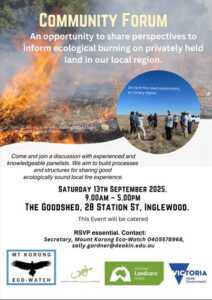 Just up the road in Inglewood, the Mt Korong Eco-Watch (MKEW) are being supported by Loddon Plains Landcare Network to host a Community Fire Forum this Saturday 13 September 2025. It is sure to be a great opportunity to contribute to this rarely discussed topic with many knowledgeable and experienced panelists.
Just up the road in Inglewood, the Mt Korong Eco-Watch (MKEW) are being supported by Loddon Plains Landcare Network to host a Community Fire Forum this Saturday 13 September 2025. It is sure to be a great opportunity to contribute to this rarely discussed topic with many knowledgeable and experienced panelists.
Mt Korong Eco-Watch (MKEW) have been conducting a series of conversations among private landholders and others over a 10-month period about ecological practices of fire. This forum will bring these conversations to a focus and with a wider group of participants. The aim is to explore the potential for establishing a sustainable process for sharing fire experiences with each other, learning together and offering guidance to others.
Contributors to the forum include Paul Foreman (Blue Devil Consulting/Biolinks Alliance), Terri Williams (landholder and teacher Bendigo TAFE), Oli Moraes (DJAARA), Peter Morison (formerly Trust for Nature), Karen Tymms (Trust for Nature), Dale Tonkinson (Biodiversity Officer CFA) and others.
When: Saturday 13 September 9am-5pm
Where: The Goodshed, 28 Station Street, Inglewood
Bookings: Essential. Contact Mount Korong Eco-Watch Secretary, Sally Gardner. Phone 0405 578 968 or email sally.gardner@deakin.edu.au
Taking Root and Branching Out
Posted on 3 September, 2025 by Lori
To celebrate Landcare Week in August, Connecting Country teamed up with Barkers Creek Landcare and Wildlife Group (BCLWG) to host a special event titled Taking Root and Branching Out on Wednesday 6 August at Phee Broadway, Castlemaine. The event centred on the launch of a beautiful audio documentary developed by local, award-winning podcast creator (and member of BCLWG), Kyla Brettle. It tells the story about the long tail of environmental damage wrought by the colonial gold rush in Central Victoria and the almost 30 year history of a tiny community group (Barkers Creek Landcare and Wildlife Group) striving to make a difference alongside a broader account of social change and the value of land-caring.
Over 150 people came to hear and learn in what has been described by some attendees as a more unusual, but extremely engaging and centering, experience where the focus was to ‘listen in’ without the overstimulation of heavy visuals. The podcast artfully articulates the journey of both landscape transformation and community learnings alongside music and local voices and you can’t help but be captivated.
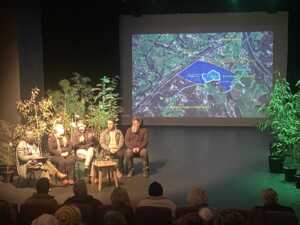
Photo: Sharon Fraser and members of the panel (L-R) Cath Jolly, Paul Foreman, Oli Moraes and Brendan Sydes discussing the Reserve.
After the podcast BCLWG provided a delicious sticky supper, a taste of the style of morning teas many Landcare groups strive after the heavy lifting of on-ground working bees. Sharon Fraser, MC for the evening then led a discussion panel about future plans for the Barkers Creek Reserve in Harcourt. Panel members Cath Jolly (BCLWG Secretary), Paul Foreman, ecologist with Biolinks Alliance, Oli Moraes, Galk-galk Dhelkunya Project Manager with DJAARA and Connecting Country President, Brendan Sydes emphasised the importance of engaging with partners and ‘experts’ to make a significant impact to our damaged countryside and the ongoing need for significant funding to achieve this ambition.
It was a heart-warming event and a big thanks go out to the Barkers Creek crew for creating this special evening in the center of Landcare Week as a celebration of what Landcare can achieve, but also what we can aspire to. If you missed it, a link to the podcast is available here and Kyla has written a reflection on the event on her Endgame Substack page.
This special event was hosted by Barkers Creek Landcare and Wildlife Group and Connecting Country with funding and support from The Victorian Landcare Program, North Central Catchment Management Authority, Ian and Shirley Norman Foundation, Mount Alexander Shire Council, The Little Red Apple, Biolinks Alliance and The Good Opp Shop.
Taking Root and Branching Out
Posted on 24 July, 2025 by Lori
All are invited to this special Landcare Week event, Taking Root and Branching Out hosted by Barkers Creek Landcare and Wildlife Group and Connecting Country at Phee Broadway Theatre on Wednesday 6 August.
Experience an immersive audio documentary by local creative audio producer Kyla Brettle, about the nearly 30-year story of Barkers Creek Wildlife and Landcare Group and the long game to restore health to the natural environments of Central Victoria.
Learn about their new Comprehensive Ecological Repair Plan for the 35 ha bushland reserve in Barkers Creek (Harcourt), and with cutting edge approaches to landscape repair, developed with local ecologist Paul Foreman from Biolinks Alliance.
Be part of a discussion led by Sharon Fraser, with representatives from Barkers Creek Landcare & Wildlife Group, Connecting Country, DJAARA and Biolinks Alliance, exploring strategies for implementing this project and how we can all help to restore health to the natural landscapes of Mt Alexander Shire.
Enjoy a fabulous Landcare ‘morning tea’, or rather, sticky supper.
When: Wednesday 6 August 2025 6:30pm -8:30pm
Where: Phee Broadway Theatre, 212 Barker Street, Castlemaine
Tickets: $15 adult /$10 concession (children under 12 free). Bookings here
This special event is hosted by Barkers Creek Landcare and Wildlife Group and Connecting Country with funding and support from Mount Alexander Shire Council, The Victorian Landcare Program, North Central Catchment Management Authority, Ian and Shirley Norman Foundation, Council, The Little Red Apple, Biolinks Alliance and The Good Opp Shop.
National Tree Day – POSTPONED TO 24TH AUGUST
Posted on 4 July, 2025 by Lori
Due to inclement weather this event has been postponed for a month to the 24th of August.
National Tree Day was established by Planet Ark in 1996 and is an annual call to action for all Australians to get their hands dirty and give back to the environment.
To celebrate, Connecting Country is partnering with the Friends of Campbells Creek to host a community planting day along the newly completed trail, just upstream from the Princess Street bridge in Campbells Creek.
We will be hoping to plant over 3000 plants which will require many helping hands, big and little! As well as planting, there will be lots of family friendly nature engagement including ‘mini forest’ creations with Wild Families (part of the Victorian National Parks Association) and nature themed craft activities.
FREE BBQ lunch with Rotary to follow.
When: Sunday 27 July 2025 10:00-1:30pm Sunday August 24th 10.00 -1.30pm
Where: Campbells Creek trail, upstream from Princess Street bridge – see map
Please bring: Your own drinking water and your favourite planting tools.
Wear: gardening/leather gloves, hat, and wear sturdy footwear and clothing suitable for the weather. Gumboots might come in handy!
This event offers an opportunity for the Mount Alexander community to come together and take direct on-ground conservation action to restore and enhance our local biodiversity. All welcome!
A bit thank-you to the event sponsors – The Hub Foundation, Community Bank Maldon and District and Mount Alexander Shire Council.
Phascogale Nest Box Workshop with Harcourt Valley Landcare
Posted on 17 March, 2025 by Hadley Cole
Bird of the Month: Jacky Winter
Posted on 17 February, 2025 by Anna
Jacky Winter (Microeca fascinans)
Welcome to Bird of the Month, a partnership between Connecting Country and BirdLife Castlemaine District. Each month we’re taking a close look at one special local bird species. We are blessed to have the brilliant Jane Rusden and Damian Kelly from BirdLife Castlemaine District writing these! We’re excited to join forces to deliver you a different bird each month, seasonally adjusted, and welcome suggestions from the community.
The Jacky Winter is one of the “Feathered Five’ indicator species selected by Connecting Country for their detailed 10-year Woodland Birds Action Plan for the Mount Alexander region. There have been noticeable declines in this species’ with the clearing of woodland in many parts of Australia. A handy way to find them, is to look along fence lines where paddocks butt up to bushland, as they love to perch on the fence wires preening or keeping an eye out for insects to eat for lunch.
Although it is a member of the generally colourful family of robins, the Jacky Winter has a more subdued colour palette of pale grey, white and brown, which allows it to blend in to the environment. Males and females are very similar in appearance. Also both sexes can be easily confused with female Hooded Robins, but the Jacky Winter is paler on the chest, it’s bill is slightly shorter and the white stripe down the side of the tail is continuous. To add to the confusion, both species’ distributions overlap considerably. Jacky Winters prefer areas of open woodland, and can be found over large parts of Australia, as well as extending into Papua New Guinea.
In suitable habitat it can be easily observed with its typical feeding behaviour of hawking for insects using the ‘sit and pounce’ tactic typical of several different robins, where it sits on a low branch and then dives down to catch prey on the ground. They can often be seen in pairs whilst feeding. Food includes a range of insects and arachnids. Given the chance they are also known to be partial to cheese. Not unusual as I have experienced similar behaviour from a Brown Treecreeper pinching cheese from my lunch.
In their breeding season they build a very small, cup-shaped nest mainly composed of twigs and bark and held together with spiders’ web. Clutch size is usually 2 eggs. Only the female incubates the eggs, but both parents feed the young. Unlike other Australian species, there is no evidence of helpers at the nest – all work is done by the breeding pair.
Long-term studies indicate that Jacky Winters are generally sedentary and remain in an area throughout the year. There is very little evidence of migration apart from some local seasonal movements. This sedentary aspect of their behaviour makes this species more vulnerable when habitat is cleared.
Partnering against Pests: Rabbit control field day
Posted on 13 January, 2025 by Anna
Connecting Country is teaming up with Victorian Rabbit Action Network (VRAN) to deliver a Rabbit Control Field Day as part of the Partnership Against Pests project (funded by Agriculture Victoria).
When: Saturday February 15th starting 9:30am-1:30pm.
Where: Harcourt ANA Hall, 7 High Street, Harcourt.
The day will include an indoor presentation followed by onsite demonstrations at a private property including an introduction to various control methods, demonstrations on how to use a bait layer or set up a bait station and a look at the impacts of rabbit harbour and burrowing systems and how to manage them.
This event is FREE but places are limited so please book your tickets HERE.
The address of the private property in Harcourt will be provided closer to the date of the event.
Please wear appropriate outdoor clothing, sturdy footwear, hat, sunscreen and bring a water bottle.
Morning tea and lunch will be provided.
Please note the field day will be rescheduled if an extreme weather event is forecast.
The rabbit control field day is funded by the Victorian State Government Partnership Against Pests Program.
Seeding Our Future – Propagation Workshop with Newstead Natives
Posted on 23 December, 2024 by Hadley Cole
One of the key threats to local flora populations is seed security, particularly those species occurring in low numbers and fragmented populations that lack genetic diversity. Considering this Connecting Country is rolling out the Seeding Our Future project which focuses on building populations and connectivity of local flora species through community engagement and educational workshops on seed collection and propagation.
In early November we hosted the first event, a Seed Collection Workshop with Seeding Victoria in Castlemaine. The workshop was well received by a crowd of nearly 40 enthusiastic participants. Dan Frost from Seeding Victoria is a wealth of knowledge and shared his deep understanding of collecting various species of indigenous seed from across central Victoria. To read more about this event – click here
The second Seeding Our Future workshop is coming up on 22 February 2025: Propagation Workshop with Newstead Natives. This workshop will provide participants with the opportunity to learn from expert nursery person Frances Cincotta who will demonstrate various propagation techniques for some of our local indigenous plants.
The workshop will include:
- Seed sowing
- Propagating from Cuttings
- Propagating through the division of plants
The workshop will also include a short presentation from Dja Dja Wurrung Clans Aboriginal Corporation (DJAARA).
When: Saturday 22 February 2025, 9.00am -1.00pm
Where: Newstead Natives Nursery, 4 Palmerston Street Newstead VIC
Cost: $20
Morning tea and lunch will be provided.
For bookings – click here
The Seeding Our Future project is funded by the North Central Catchment Management Authority through the 2024 Victorian Landcare Grants.


